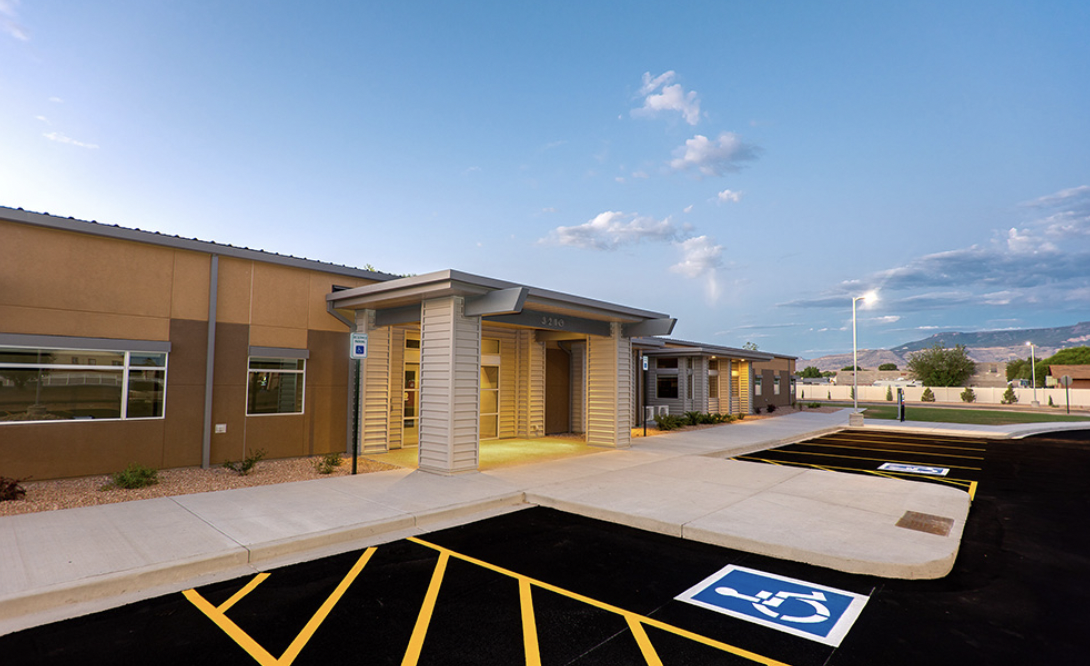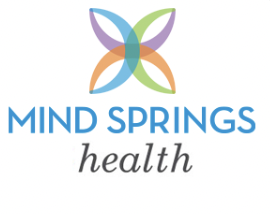Mind Springs Health - The Women's Recovery Center
Overview
Mind Springs Health, located in Grand Junction, Colorado, is a comprehensive facility dedicated to providing treatment for addiction recovery and mental health care. The center offers various levels of care, including inpatient services, outpatient services, and residential services, ensuring that each client's unique needs are met with appropriate and effective treatment options.
Among its inpatient services, Mind Springs Health operates the Women's Recovery Center, a specialized 16-bed facility situated on nearly seven acres of serene landscape. This center is designed to offer holistic treatment exclusively for women, incorporating a wide range of therapeutic modalities. The Women's Recovery Center provides innovative therapies such as light therapy, gardening therapy, and 3-D Virtual Therapy. Additionally, clients benefit from Motivational Enhancement Therapy, Dialectical Behavior Therapy (DBT), and art therapy, all aimed at fostering a comprehensive and integrative approach to recovery.
The Women's Recovery Center also accommodates mothers and their children, offering dedicated rooms that support family unity and healing. By providing a nurturing and supportive environment, Mind Springs Health ensures that women receive the highest standard of care as they work towards recovery and overall well-being.
Mind Springs Health's commitment to individualized and holistic care underscores its mission to promote long-term recovery and mental health stability for all clients.
Mind Springs Health - The Women's Recovery Center at a Glance
Payment Options
- Access to Recovery (ATR) Voucher
- Medicaid
- Private health insurance
- Cash or self-payment
- State-financed health insurance plan other than Medicaid
Assessments
- Comprehensive mental health assessment
- Comprehensive substance use assessment
Age Groups
- Adults
- Young adults
Operation
- Treatment duration
- Private non-profit organization
Treatment At Mind Springs Health - The Women's Recovery Center

Conditions Treated
Mental health treatment:
Mental health treatment involves a range of therapeutic approaches, provided by licensed professionals, to address mental health challenges. It includes psychotherapy, medication, and holistic practices to help individuals manage conditions, improve coping skills, and enhance overall well-being. The goal is to empower individuals to lead fulfilling lives and reduce the stigma surrounding mental health.
Alcoholism:
Alcohol addiction is a condition where a person's brain gets used to having alcohol, making it hard for them to control their drinking. This can lead to feeling down, acting without thinking, wanting alcohol strongly, and feeling sick if they don't drink. To help with this, treatment programs are available. These usually include a guided process to safely stop drinking, talking with professionals to work through problems, and joining support groups with others facing similar issues. While these treatments can't fully cure the addiction, they provide tools and support to help individuals live a better life and keep their drinking under control.
Opioid Addiction:
Opioid rehabilitation centers focus on aiding individuals in overcoming opioid addiction, whether stemming from illegal substances like heroin or prescription medications like oxycodone. These facilities provide a comprehensive approach that combines medical detoxification and ongoing physical care with intensive therapy to address the root causes of addiction.
Substance use treatment:
Substance use rehabilitation embodies a holistic treatment approach crafted to assist individuals contending with drug or alcohol addiction. This all-encompassing rehabilitation strategy encompasses two crucial components: initially addressing the physical dependency, frequently commencing with detoxification, and subsequently confronting the psychological triggers through a diverse array of therapeutic methods. The overarching objective is to empower individuals to achieve and maintain sobriety while equipping them with essential skills and coping mechanisms for a successful reintegration into society and a life free from substance abuse.
Co-occurring Disorders:
Dual-diagnosis rehabilitation centers often offer the most suitable approach for addressing concurrent mental health and substance abuse issues. These facilities typically employ a team of medical and behavioral specialists who utilize a variety of interventions and create a conducive healing environment to support your journey toward lasting recovery. Their comprehensive treatment approach typically encompasses evidence-based therapies such as cognitive-behavioral therapy, recovery support meetings, 12-step facilitation, psychoeducation, skills training, and group therapy to help you achieve and maintain long-term wellness.

Levels Of Care
Detoxification:
Drug and alcohol addiction often takes a heavy toll on one's body. Over time, a physical dependence can develop, meaning the body physiologically needs the substance to function. Detox is the process of removing drugs and/or alcohol from the body, a process that can be lethal if mismanaged. Medical detox is done by licensed medical professionals who monitor vital signs and keep you safe, healthy, and as comfortable as possible as you go through detox and withdrawal. The length of stay at the detoxification program is determined according to the specific needs of the patient.
Aftercare:
Aftercare refers to the structured support and programs offered to individuals after completing an initial treatment phase for substance abuse or other disorders. Recognizing that recovery is an ongoing process, aftercare provides continued counseling, skill-building, group therapy, and resources to help individuals maintain sobriety, manage triggers, and reintegrate into daily life, reducing the risk of relapse and ensuring long-term success in recovery.
Halfway house:
A sober living residence provides a nurturing atmosphere where individuals in recovery offer each other mutual support while sharing household duties. Residents actively engage in 12-step programs and hold one another accountable for maintaining sobriety. To continue residing in either a men's or women's sober living environment, individuals must stay free from drugs and alcohol, actively contribute to household responsibilities, attend support group meetings, and contribute to the living expenses of the home.
Hospital inpatient treatment:
Inpatient treatment involves a comprehensive residential therapeutic program where patients stay on-site for a duration typically ranging from 30 to 90 days. This immersive environment offers structured support, ensuring safety and a focus on recovery. Therapies provided include individual and group counseling, cognitive-behavioral therapy, holistic treatments, family therapy sessions, and experiential therapies. The aim is to address addiction or mental health disorders' physical, emotional, and psychological aspects, laying a robust foundation for sustained healing.

Treatment Modalities
Individual psychotherapy:
Individual Psychotherapy provides a private, one-on-one setting where clients can explore and address their personal challenges, behaviors, and feelings related to addiction and recovery. With the guidance of a trained therapist, clients work to uncover the root causes of their substance use, develop coping strategies, and build a foundation for long-term recovery and personal growth.
Family counseling:
Family Counseling is a therapeutic service that addresses and resolves conflicts, improves communication, and fosters better relationships within a family unit. Through guided discussions, a trained counselor helps family members gain insight into their dynamics, learn coping strategies, and work towards creating a harmonious living environment. Family Counseling can be a significant step towards improving the overall emotional health and interactions among family members, helping them navigate challenges together in a supportive and constructive manner.
Life Skills:
Life Skills is a crucial component of rehabilitation that focuses on equipping individuals with the practical abilities necessary to maintain sobriety and lead fulfilling lives. These skills encompass a wide range of capabilities, including but not limited to time management, communication, problem-solving, stress management, and financial literacy. By acquiring and honing these essential life skills, individuals in addiction treatment gain the tools and confidence needed to navigate the challenges of daily life, reduce the risk of relapse, and ultimately achieve lasting recovery.
Cognitive Behavioral Therapy:
Cognitive Behavioral Therapy (CBT) is a evidence-based psychological treatment that focuses on identifying and challenging negative thought patterns and behaviors. It aims to develop coping strategies and promote healthier thinking to address a variety of mental health issues, such as depression, anxiety, and stress. CBT is typically short-term and goal-oriented, emphasizing the role of thought processes in influencing emotions and behaviors.
Dialectical Behavior Therapy:
Dialectical Behavior Therapy (DBT) is a form of psychotherapy that blends cognitive-behavioral approaches with mindfulness strategies. It is particularly effective in treating addiction, as it addresses the underlying emotional pain and destructive behaviors that often accompany substance misuse. Through enhancing emotional regulation, distress tolerance, interpersonal effectiveness, and mindfulness, DBT equips individuals with the coping skills necessary to maintain sobriety and improve their overall quality of life.
Motivational Interviewing:
Motivational Interviewing (MI) in addiction treatment is a client-centered counseling approach designed to enhance an individual's intrinsic motivation to change. By addressing ambivalence and tapping into personal values, MI fosters meaningful conversations about substance use and promotes commitment to recovery-focused goals.
Trauma-related counseling:
Trauma therapy addresses the underlying emotional and psychological wounds that may contribute to an individual's substance abuse. Through a combination of psychotherapy and coping strategies, individuals are aided in processing past traumatic experiences, understanding the impact of trauma on their current behavior, and developing healthier coping mechanisms. This holistic approach fosters resilience, aids in the resolution of trauma, and is fundamental in supporting individuals on their path toward sustained recovery from addiction.
Group counseling:
Group Counseling is a therapeutic approach where individuals come together under the guidance of a trained counselor to share experiences, provide mutual support, and gain insights. It fosters a sense of community, promotes understanding through diverse perspectives, and offers personal growth and problem-solving strategies.
Fitness Therapy:
"Fitness Therapy" refers to the integration of exercise and movement techniques with therapeutic principles to promote mental and physical well-being. It emphasizes the connection between physical activity and emotional health, harnessing the healing powers of exercise to aid in rehabilitation, manage chronic conditions, reduce stress, and improve overall quality of life. Through personalized regimens and mindful practices, Fitness Therapy seeks to holistically empower individuals to achieve their health and wellness goals.
Holistic Treatment:
A holistic approach encompasses a "whole person" perspective in treatment, emphasizing the interconnectedness of mental, physical, and spiritual health. At its core, holistic therapy believes in the seamless integration of an individual's body, mind, emotions, and spirit. In the context of addiction recovery, this approach ensures that the entire person is catered to, rather than isolating a specific symptom or behavior. Holistic treatments aim to enhance the individual's complete well-being instead of merely addressing isolated issues.
Ancillary Services
Special Programs
- Pregnant/postpartum women
- Clients who have experienced trauma

Additional Locations
Contact Information
DISCLAIMER: The facility name, logo and brand are the property and registered trademarks of Mind Springs Health - The Women's Recovery Center, and are being used for identification and informational purposes only. Use of these names, logos and brands shall not imply endorsement. BetterAddictionCare.com is not affiliated with or sponsored by Mind Springs Health - The Women's Recovery Center.




